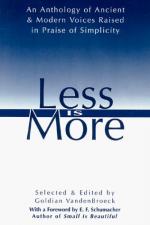|
This section contains 608 words (approx. 2 pages at 400 words per page) |

|
Chapter 7 Summary and Analysis
Controlled Folly
Enough Is Enough
William Penn (1644-1718) writes that few people know when they have enough and fewer yet know how to use it. Seneca proclaims that the "enough" provided by nature is adequately abundant. Thoreau finds that he is rich as long as he is able to leave things untouched. George McDonald (1824-1905) writes that when a man has what he wants, he is rich; when he is able to do without what he wants, he is powerful.
Fortuna: Stopping the Wheel
Plutarch (46-120) is thankful that his only ship has been lost at sea. Left penniless, he will be able to lead the life of a philosopher. Boethius (480-524) writes of Fortune stopping the wheel—a metaphor that illustrates that wealth causes man to stop growing.
Sweet Content
Contentment with one's life is truly what makes one...
(read more from the Chapter 7 Summary)
|
This section contains 608 words (approx. 2 pages at 400 words per page) |

|




